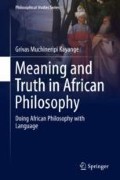Abstract
This chapter investigates the Chewa concept of truth through a reflection on the relation between statements and reality/facts. It argues that the Chewa people have a logical concept of truth, which is dependent on the relation between statements and reality, and the requirement of observation. It is argued that for a sentence to be true, it must correspond to facts, and there must be ontological commitment supporting this relation.
Access this chapter
Tax calculation will be finalised at checkout
Purchases are for personal use only
Notes
- 1.
I am aware of the existence of different theories of truth, but my interest is on analytic philosophy . In fact, philosophy has for a long time been accompanied by five theories of truth namely, correspondence theory of truth, the coherence theory of truth, pragmatic theory of truth, semantic theory of truth and redundant theory of truth (Walker 2000, 309–330). For example, Coherence theory of truth has also been commonly promoted as it underlined the truth of a proposition as consisting in its coherence with other propositions.
- 2.
In analytic philosophy during the early days, philosophers of the Vienna Circle supported the idea of truth as correspondence to the facts. Different versions of this concept were developed by philosophers such as Schlick, Wittgenstein and Alfred Ayer.
- 3.
T represents truth.
- 4.
- 5.
See also (Oruka 1988).
- 6.
Some of his ideas will be incorporated in my development below.
- 7.
The opposite of truth is zonama or zabodza.
- 8.
Berkeley’s famous expression that captures this idea of existence as determined by seeing is, esse et percipi (to be is to be perceived).
- 9.
Another proverb on patience: Fisi akatola fupa sadyera pomwepo (When a Hyena gets a bone he will not eat it right there)-refers to the importance of patience in revealing what is true.
- 10.
As is well known this conception of knowledge was questioned by Gittier.
- 11.
Another proverb on deception is, Musamayese ndi masweswe, ndi dazi (Do not think it is a mere rim of hair, this is baldness).
- 12.
The story behind this proverb is that the individual in question thought that the presence of bees on flowers meant that there was also honey. This person did not understand properly about bees and honey making process. For truth to come about, the individual needs to see by himself not just depending on the information given by others. This is indicative of the fact there is a certain degree of mistrust towards information that is given from others.
- 13.
There is an interesting attitude in Malawi whereby individuals run towards any noise they hear so that they can see by themselves.
- 14.
This attitude is encouraging the fundamentality of doing research in order to come out with good results.
- 15.
Note that the notion above represents better the common idea of truth in this context although there are other concepts among the Chewa that represents the notion, ‘truth.’
- 16.
Note that they symbol ∧ is a conjunct joining C, E.
References
Chakanza, J.C. 2000. Wisdom of the People: 2000 Chinyanja Proverbs. Zomba: Kachere.
Costa, N.D., and S. French. 2003. Science and Partial Truth. Oxford: Oxford University Press.
Fraassen, B.V. 1980. The Scientific Image. Oxford: Oxford University Press.
Giere, N.R. 2006. Scientific Perspectivism. Chicago: University of Chicago Press.
Hallen, B. 2004. Yoruba Moral Epistemology. In A Companion to African Philosophy, ed. K. Wiredu, 296–303. Oxford: Blackwell.
Hegel, G. W. [1807] 1977. Phenomenology of Spirit. Oxford: Oxford University Press.
Kaphagawani, D. [1998] 2000. African Conceptions of Personhood and Intellectual Identities. In The African Philosophy Reader, P. H. Roux, 240–244. New York: Routledge.
Leibniz, G.W. 1889. The Monadology and Other Philosophical Writings. Oxford: Oxford University Press.
Lewis, D. 1973. Counterfactuals. Oxford: Blackwell.
Oruka, O. 1975. Truth as Belief. Universitas 177–184. Retrieved from erepository.uonbi.ac.ke/bitstream/handle/.../Oruka_Truth%20and%20Belief.pdf?...
———. 1988. For the Sake of Truth: A Response to Wiredu’s Critique of 'Truth and Belief. Quest 11: 3–22.
Popper, K.R. 1959. The Logic of Scientific Discovery. London/New York: Routledge.
———. 1963. Conjectures and Refutation. London: Routledge.
———. 1972. Objective Knowledge. Oxford: Oxford University Press.
Putnam, H. 1987. The Many Faces of Realism. La Salle: Open Court.
Stalnaker, R. 1968. A Theory of Conditionals. In Studies in Logical Theory, ed. N. Rescher, 113–128. London: Oxford University Press.
———. 2003. Ways a World Might Be: Metaphysical and Anti-Metaphysical Essays. Oxford: Oxford University Press.
Tarski, A. 1944. The Semantic Concept of Truth and the Foundations of Semantics. Philosophy and Phenomenological Research 4: 341–375.
Walker, R.C. 2000. Theories of Truth. In A Companion to the Philosophy of Language, ed. B. Hale and C. Wright, 309–330. Oxford: Blackwell.
Wiredu, K. 1972. Truth as Opinion. UNIVERSITAS 1.
———. 1985. The Concept of Truth in the Akan Language. In Philosophy in Africa: Trends and Perspectives, ed. P. Bodunrin, 43–54. Ife: University of Ife Press.
———. 1995. Knowledge, Truth and Fallibility. In The Concept of Knowledge, ed. I.K. Cohen. Boston: Kluwer Academic.
Wittgenstein, L. 1922. Tractatus Logico-Philosophicus. London: Routledge and Kegan Paul.
Author information
Authors and Affiliations
Rights and permissions
Copyright information
© 2018 Springer Nature Switzerland AG
About this chapter
Cite this chapter
Kayange, G.M. (2018). The Chewa Logical Concept of Truth. In: Meaning and Truth in African Philosophy. Philosophical Studies Series, vol 135. Springer, Cham. https://doi.org/10.1007/978-3-030-01962-4_6
Download citation
DOI: https://doi.org/10.1007/978-3-030-01962-4_6
Published:
Publisher Name: Springer, Cham
Print ISBN: 978-3-030-01961-7
Online ISBN: 978-3-030-01962-4
eBook Packages: Religion and PhilosophyPhilosophy and Religion (R0)

